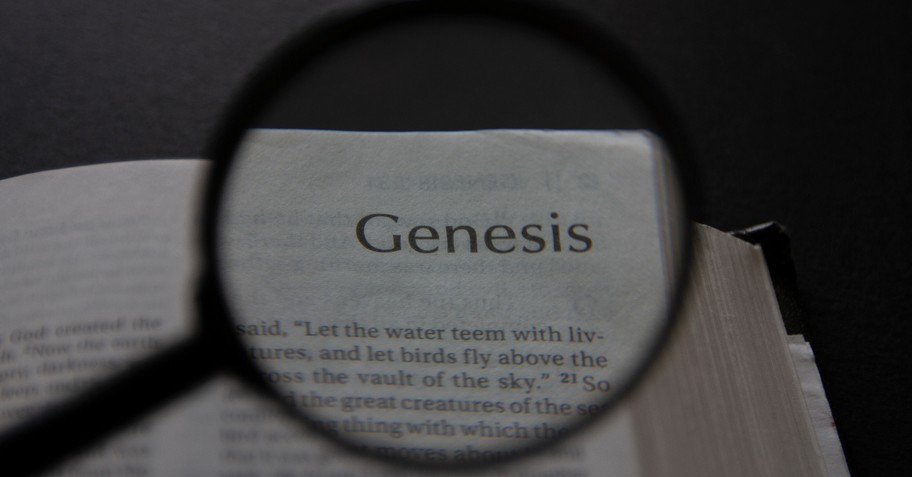What Was the Mark of Cain and It's Meaning?

Genesis chapter 3 closes in what the prodigious English poet, John Milton, rightly called, “Paradise Lost.” Our first parents are banished from the Eden and the Garden of Eden is closed to them and their offspring—until the fullness of time has come when a Redeemer will fulfill the First Gospel (Gen. 3:15): a promise to crush the head of the devil and restore Eden—not by reopening the ancient garden gate, with the rusted hinges creaking, but by unveiling a New Heaven and a New Earth.
So, Adam and Eve were sent East of Eden. East of Eden is not so much a direction as it is a depiction; a depiction of a life lived away from God’s will. It is the consequence of a sinful choice. East of Eden is hard ground contrasted with the fertile flowering fields of dear old Eden.
This leads to the story of Cain and Abel, and the mark that God set on Cain. So the question is, what is the mark of Cain?
Photo Credit: © Unsplash/Guille Pozzi
The Origin of the Phrase “Mark of Cain”
There is a significant lack of consensus among translators about the word that is used in Genesis 4:15. Our modern versions, each trustworthy, differ on the best English word to use for this ancient Hebrew word. For instance, the English Standard Version, joining the New International Version, the New King James, and a majority of others, translates it, “And the LORD put a mark [my emphasis] on Cain, lest any who found him should attack him.”
The New American Standard Bible (1995), Smith’s Literal Translation, World English Bible, and the American Standard (1901) considered the preference of the Septuagint (the Greek translation of the Hebrew) and translate it as “sign.”
If you are troubled by this, then, perhaps, you will find comfort that the English-speaking Jewish translations of Genesis also differ. The Orthodox Bible translates the word, “oth” as “Mark.” The Complete Jewish Bible uses the word, “sign.”
So what? Some might find this a difference without a distinction. Sign and mark can mean the same thing in modern English. However, the Hebrew word employed in Genesis 4:15 is used 75 out of 78 other times as “sign” (Wigram). For instance, the seasons are given by “oth” to mark time: “God said, "Let there be lights in the dome of the sky to divide the day from the night; let them be for signs, [my emphasis] seasons, days and years” (Genesis 1:14). In each of the translations that used “mark” in Genesis 4:15, the same use “signs” for the same Hebrew word in Genesis 1:14. So you can see there is an interpreter or committee concern present. Here is the issue:
Cain’s “mark” seems to suggest a physical mark upon his skin, or some other distinguishing visible blemish, or physical deformation, upon his body. Alternatively, Cain’s “sign” could have been a covenant-like token of God’s promise that set Cain apart as a recipient of this divine mercy. Now that we know the origin of this phrase, let's study this story in Scripture to fully understand it's meaning.
The Story of Cain and Abel
As Genesis chapter 3 concludes with banishment East of Eden, so chapter 4 begins the story of humankind in that land. There Adam and Eve were blessed with sons, their first-born, Cain, then Abel. The Bible describes the two boys. The firstborn, Cain, had dirt under his fingernails. He was a farmer, and his days were spent tilling the thorn-infested earth. His younger brother, Abel, was a shepherd. The shepherd conjures up images of pastoral fields, songs to be sung that were David-like, in part to soothe the flock, in part to comfort the shepherd, and by all means to send a message to wolves. Abel the shepherd offered the first and finest to God from his flock. Cain gave out of his harvest—not of the first fruits. Cain gave of his grain. There was no blood sacrifice. And while the text does not stipulate this reason as the reason that God rejected the offering of Cain, we do not read the Bible by verses alone but in the context of the whole. Or was it the attitude of the farmer, Cain? Did Cain offer his gift begrudgingly?
Both the attitude and the gift itself are necessary. God stipulates how we should worship him. It is not our own preferences or that which is most convenient or expedient for us. Cain sensed and perhaps witnessed this blessing upon his brother. "Is a Shepherd any better than a farmer?" Cain might have asked himself as his fury came to a boil. Perhaps he resented the shepherd boy brother of his. Perhaps Cain's callused hands and aching back agitated his spirit as he considered the relative and perceived ease of his brother’s labors compared to his. There came a time when the pot boiled over. The raging passions within one brother broke through the moral levies of his soul. Cain killed his brother Abel. Thus, we read the rest of the story in Genesis chapter 4:8-16.
And so, as chapter 3 concluded with the banishment of Adam and Eve to a painful place, so the punishment of their son’s fratricidal sin cast him deeper away from the blessed Garden. Once more, the Bible speaks of this place called East of Eden.
That Great Western author from Salinas County, California, John Steinbeck, recognized the story of humanity in the story of those brothers and their lives lived east of Eden:
Some men are friends with the whole world in their hearts, and there are others that hate themselves and spread their hatred around like butter on hot bread. — John Steinbeck, East of Eden

What Exactly Was the Mark of Cain?
One contemporary translator was more comfortable in merely examining the differences between reliable scholarship and differentiating between the more extreme and unlikely. Thus, the sign could have been a physical manifestation (a branding, or a “shaking,” as the Septuagint translators thought) or a sign like unto Noah, a guarantee to Cain that he would protest him and carry out a sentence that was seven times worse than Cain’s punishment.
The answer? We do not know. This means that we know what we don’t know, and there is some virtue in that position. For we are left to understand that God provided a mark or a sign—your preference—to assuage the fear in the heart of Cain. It is to be remembered that divine protection is not necessarily eternal salvation of one’s soul.
The sign or mark of Cain does have significant spiritual value for our lives. We must remember that God is with us even when we are not with him. We have a haven or rest amidst the storms of life. We have a safe-house—the Body of Christ—to guard us against the passions of self and the devilish assailants of this “present evil age.” Let us, also, recall that in John 17, our Lord Jesus prayed for us before we ever prayed to him. Herein is the pre-converting grace of Almighty God. Though we were banished by our own sinfulness from the face of God, God nevertheless gives us a sign to protect us, to provide an opportunity to repent and believe. Our sign of protection, our sign of hope, our sign of salvation, is the Savior on the cross.
It may very well be that you have been on the run all your life from God. Perhaps you are running from the sin in your heart or even from passions that manifested in hatred, bitterness, or even physical violence against another. Even if you read these words from behind prison bars you must know that God walks the corridors of that correctional facility. God is with you. God is for you. God is guarding your life so that you may come to him. How long-suffering. How kind. How very much like our Lord.
Photo Credit: ©iStock/Getty Images Plus/Gearstd

The Context for the Mark of Cain
Clearly, as Genesis chapter 3 concludes, and Genesis 4:16 wraps up the tragic Cana and Abel story, including the question about the mark of Cain, we should pay attention to the repetitive, “East of Eden” phrase. God is telling us something. The context for the first homicide leads us to reflect on the world in which we live.
Let us, then, consider the expository and universal truths from Genesis 4 for our lives today.
1. In the East of Eden the rain falls on the just and the unjust. Abel became the fatal victim of an unrecoverable minute of uncontrolled, homicidal anger, by none other than his brother. In East of Eden—which is, of course, where we live our years—we are subject to the pain and sorrow that comes not only from our sins, but from living in the land of Nod.
2. In the East of Eden the sinful nature that is the terrible consequence of the full is present and must be faced. “And if you do not do well, sin is crouching at the door. Its desire is contrary to you, but you must rule over it” (Genesis 4:6-7, ESV).
3. In the East of Eden the sinful nature must be conquered. Jesus Christ demonstrated his love for sinners by coming into the world and living the life we could not live and taking upon himself the punishment of our sins. Receive Jesus Christ and be filled with the Holy Spirit that you may be empowered to do what is good, to resist the devil that he may flee, and to subdue the darker passions that can brew within us.
4. In the East of Eden God establishes his justice. God judged Cain. He would live with the penalty of his offense for the rest of his days. Yet, the Almighty God was even kind to the offender. Cain's killing of his brother was an active passion that will forever carry the notorious label, "the first homicide in human history." However, God had mercy even upon the offender. This demonstrates how God has mercy on you and me when we fall into sin.
5. In the East of Eden, God’s mercy does not erase the consequences of sin in this life. Because of his horrendous sin, God removed Cain from his family, distanced him from his parents and home, cut off his relationship with the land, and began a life of nomadic existence. God’s justice is complete. Yet, God’s mercy is greater. “Moreover the law entered that the offense might abound. But where sin abounded, grace abounded much more” (Romans 5:20 NKJV).
The one without Christ is a cosmic nomad in this fallen world. Unless we repent and turn to God’s Redeemer, our Lord and Savior Jesus Christ, we, too, will roam the earth all the days of our lives in search of something or someone to still the roaring silence in our souls.
Our contextual study now leads us to our main question and a Biblical answer that arises out of a fuller understanding of the sacred writings.
“What was the mark of Cain?” We read the text within context.
Surely You have driven me out this day from the face of the ground; I shall be hidden from Your face; I shall be a fugitive and a vagabond on the earth, and it will happen that anyone who finds me will kill me.”
And the Lord said to him, “Therefore, whoever kills Cain, vengeance shall be taken on him sevenfold. And the Lord set a mark on Cain, lest anyone finding him should kill him (Genesis 4:14-15 NKJV).
6. East of Eden there is a sign that God mercifully placed upon and around sinners. Cain knew that others (at this point in human history, he was surrounded by siblings, and, perhaps, the children of married siblings) would want to exact vengeance upon him for this crime of passion. So, God protected Cain from the sin of anarchy and vigilantism with “a sign.”
Conclusion
The mark of Cain is the story of a life lived “east of Eden.” There is good and there is evil. There is tragedy. There is triumph. There is guilt over sin. There is a world filled with those who are running from God, banished from his presence by acting on the sin nature inside. However, God gave a sign: he stops the schemes of demons and stills the rage of others, that we may repent and believe through Jesus Christ our Lord. The sign then becomes the mark. For we are sealed until the Day of Redemption.
Sources:
George Vicesimus Wigram, The New Englishman’s Hebrew Concordance: Coded to Strong’s Concordance Numbering System (Hendrickson, 1984).
Photo Credit: ©Sparrowstock
Originally published October 20, 2021.









